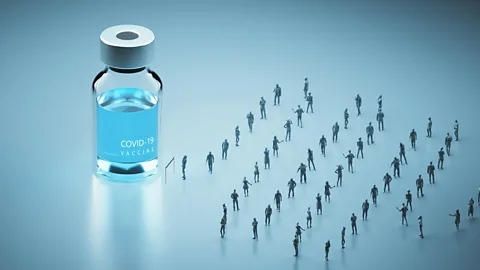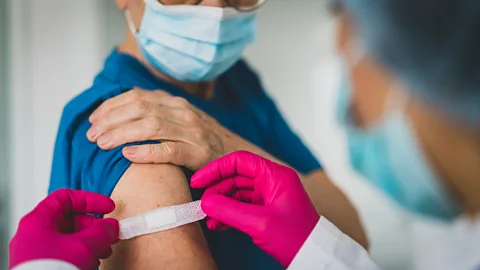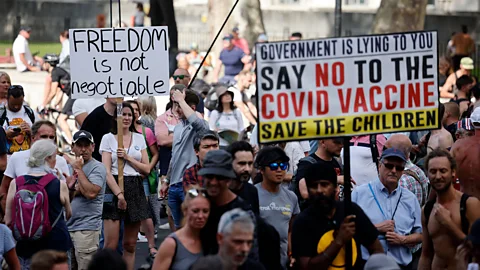Why some people don't want a Covid-19 vaccine
 Andriy Onufriyenko/Getty Images
Andriy Onufriyenko/Getty ImagesSocial media is rife with posts disparaging the vaccine hesitant – but these reactions to a complex and nuanced issue are doing more harm than good.
As we head towards the end of another extraordinary year, BBC Future is taking a look back at some of our favourite stories for our "Best of 2021" collection. Discover more of our picks here.
There should be no doubt about it: Covid-19 vaccines are saving lives.
Consider some recent statistics from the UK. In a study tracking more than 200,000 people, nearly every single participant had developed antibodies against the virus within two weeks of their second dose. And despite initial worries that the current vaccines may be less effective against the Delta variant, analyses suggest that both the AstraZeneca and the Pfizer-BioNTech jabs reduce hospitalisation rates by 92-96%. As many health practitioners have repeated, the risks of severe side effects from a vaccine are tiny in comparison to the risk of the disease itself.
Yet a sizeable number of people are still reluctant to get the shots. According to a recent report by the International Monetary Fund, that ranges from around 10-20% of people in the UK to around 50% in Japan and 60% in .
The result is becoming something of a culture war on social media, with many online commentators claiming that the vaccine hesitant are simply ignorant or selfish. But psychologists who specialise in medical decision-making argue these choices are often the result of many complicating factors that need to be addressed sensitively, if we are to have any hope of reaching population-level immunity.
The 5Cs
First, some distinctions. While it is tempting to assume that anyone who refuses a vaccine holds the same beliefs, the fears of most vaccine hesitant people should not be confused with the bizarre theories of staunch anti-vaxxers. "They're very vocal, and they have a strong presence offline and online," says Mohammad Razai at the Population Health Research Institute, St George's, University of London, who has written about the various psychological and social factors that can influence people's decision-making around vaccines. "But they’re a very small minority."
You might also like:
The vast majority of vaccine-hesitant people do not have a political agenda and are not committed to an anti-scientific cause: they are simply undecided about their choice to take the injection.
The good news is that many people who were initially hesitant are changing their mind. "But even a delay is considered a threat to health because viral infections spread very quickly," says Razai. This would have been problematic if we were still dealing with the older variants of the virus, but the higher transmissibility of the new Delta variant has increased the urgency of reaching as many people as quickly as possible.
 Jasmine Merdan/Getty Images
Jasmine Merdan/Getty ImagesFortunately, scientists began studying vaccine hesitancy long before Sars-Cov-2 was first identified in Wuhan in December 2019, and they have explored various models which attempt to capture the differences in people's health behaviour. One of the most promising is known as the 5Cs model, which considers the following psychological factors:
Confidence: the person's trust in the vaccines efficacy and safety, the health services offering them, and the policy makers deciding on their rollout
Complacency: whether or not the person considers the disease itself to be a serious risk to their health
Calculation: the individual's engagement in extensive information searching to weigh up the costs and benefits
Constraints (or convenience): how easy it is for the person in question to access the vaccine
Collective responsibility: the willingness to protect others from infection, through one's own vaccination
In 2018, Cornelia Betsch at the University of Erfurt in and colleagues asked participants to rate a series of statements that measured each of the 5Cs, and then compared the results with their actual uptake of relevant procedures, such as the influenza or the HPV vaccine. Sure enough, they found that the 5Cs could explain a large amount of the variation in people's decisions, and consistently outperformed many other potential predictors – such as questionnaires that focused more exclusively on issues of trust without considering the other factors.
In currently unpublished research, Betsch recently used the model to predict people's uptake of the Covid-19 vaccines, and her results so far suggest that the 5Cs model can explain the majority of the variation in people's decisions.
There will be other contributing factors, of course. A recent study from the University of Oxford suggests that a fear of needles is a major barrier for around 10% of the population. But the 5Cs approach certainly seems to capture the most common reasons for vaccine hesitancy.
Confirmation bias
When considering these different factors and the ways they may be influencing people's behaviour, it is also useful to examine the various cognitive biases that are known to sway our perceptions.
Consider the first two Cs – the confidence in the vaccine, the complacency about the dangers of disease itself.
 Tolga Akmen/AFP/Getty Images
Tolga Akmen/AFP/Getty ImagesJessica Saleska at the University of California, Los Angeles points out that humans have two seemingly contradictory tendencies – a "negativity bias" and an "optimism bias" that can each skew people’s appraisals of the risks and benefits.
The negativity bias concerns the way you appraise events beyond your control. "When you're presented with negative information, that tends to stick in your mind," says Saleska. The optimism bias, in contrast, concerns your beliefs about yourself – whether you think you are fitter and healthier than the average person. These biases may work independently, meaning that you may focus on the dangerous side effects of the vaccines while simultaneously believing that you are less likely to suffer from the disease, a combination that would reduce confidence and increase complacency.
Then there's the famous confirmation bias, which can also twist people's perceptions of the risks of the virus through the ready availability of misinformation from dubious sources that exaggerate the risks of the vaccines. This reliance on misleading resources means that people who score highly on the "calculation" measure of the 5Cs scale – the people who actively look for data – are often more vaccine hesitant than people who score lower. "If you already think the vaccination could be risky, then you type in 'is this vaccination dangerous">window._taboola = window._taboola || []; _taboola.push({ mode: 'alternating-thumbnails-a', container: 'taboola-below-article', placement: 'Below Article', target_type: 'mix' });
